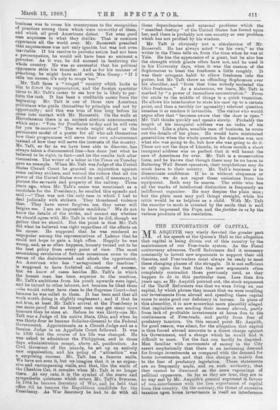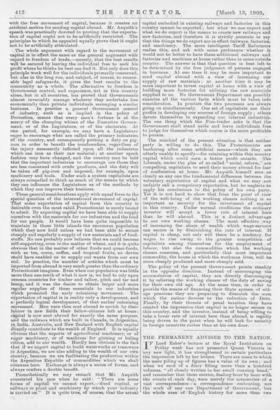ME EXPORTATION OF CAPITAL.
31[R. ASQUITH very wisely devoted the greater part of his speech at the Queen's Hall to the allegation that capital is being driven out of this country by the maintenance of our Free-trade system. As the Fiscal controversy advances, Tariff Reformers find it necessary constantly to invent new arguments to support their old theories, and Free-traders must always be ready to meet these changing phases of the struggle. It is not sufficient to rely upon the fact that the new arguments often completely contradict those previously used, as they happen to do in this particular ease. Less than five years ago, as Mr. Asquith pointed out, the stock argument of the Tariff Reformers was that we were living on our capital, by which phrase they meant that we were recalling our investments from abroad and. spending these capital sums to make good our deficiency in income. In place of this absurdity, it is now somewhat more plausibly alleged that capitalists are sending their money abroad, partly from lack of profitable investments at home due to the continuance of Free-trade, and partly from fear of predatory taxation. On this second point Mr. Asquith, for good reason, was silent, for the allegation that capital is thus forced abroad amounts to a direct charge against his Government, and a eharge which he would find it difficult to meet. Yet the fact can hardly be disputed. Men familiar with movements of money in the City assert emphatically that there is an increasing demand for foreign investments as compared with the demand for home investments, and that this change is mainly due to the fear of predatory legislation. These statements are so frequently made, and on such authority, that they cannot be dismissed as the mere vapourings of political opponents. So far as they are true, they are in no way met by Mr. Asquith's general argument in favour of nou-iuterference with the free exportation of capital from this country. On the contrary, the threat of excessive taxation upon home investments is itself an interference with the free movement of capital, because it creates an Artificial motive for sending capital abroad. Mr. Asquith's -speech was practically devoted to proving, that the exporta- tion of capital ought not to be.artificially restricted. :The principles to which he appealed equally prove that it.ought not to be artificially stimulated.
The whole argument with regard to the movement of capital is in'effect the same as the general 'argument with regard to freedom of trade,—namely, that the best results will be secured by leaving the individual free to seek his profit where he thinks be best Can find it. Not only does this principle 'work Well for the individuals primarily concerned, but also in the long run, and subject, of course, to reason- bible legal safeguards, it gives the best results to the community as a whole. The alternative to freedom is Government control, and experience, miot in this country alone, but in all countries, has proved that Governments almhost, invariably manage whatever they undertake . less economically than private individuals managing a similar buSiness. In practice a general Government control of industry, such as is implied in • the policy of Protection, means that every man's fortune is at the mercy of the changing whims of the Executive Govern- ment, • or of the Legislature, or of the electorate. At one period, for example, we may have a Legislature eager to encourage what are called the primary industries of the country, and consequently putting a duty on pig- iron in order to benefit the ironfounders, regardless of the injury necessarily inflicted upon all the industries which use iron as their raw material; at another epoch faihion may have changed, and the country may be told that the important industries to encourage are those that are less concerned with crude products, and the duty will be. taken off pig-iron and imposed, for example, upon machinery and tools. Under such a system capitalists are always compelled to think as much of the means by which they can influence the Legislature as of the methods by which they can improve their business.
These general considerations apply with equal force to the speCial'question of the international movement of capital. That some exportation of capital from this country is 'delmirable even the most rabid Protectionist is surely bound to admit. By exporting capital we have been able to supply 'ourselves with the materials for our industries and the food fey our people. It would have been quite impossible to itiaintain in these little islands the enormous population WiriCh they now hold unless we had been able to secure Cheaply and regularly a supply of raw materials and of food- stuffs. No one probably now believes that we could become self-supporting, even in the matter of wheat, and it is quite obvious that in the matter of other foods and quasi-foods, inch as tea, cocoa, coffee, and tropical fruits, no device *mild have enabled us to supply our wants from our own seil. In practice, the number of articles which must be imported from abroad is very much greater than the ordinary Protectionist imagines. Even when our population was little more than one-tenth of what it now is, we had to rely upon versea countries for timber and tallow, pitch mind tar and hemp, and it was the desire to obtain larger and more regular supplies of these essentials to our industries Which . promoted the early Colonising movement. The exportation of capital is in reality only a development, and a. perfectly logical development, of that earlier colonising movement. Men were then sent abroad to enrich by their labour in new fields their fellow-citizens left at home; CalPital is now sent abroad for exactly the same purpose, add the railways which are built in Canada, in Argentina, itm,Inditi, Australia, and New Zealand with English capital directly contribute'to the wealth of England. It is equally obvious that the exports of agricultural .machinery, or of smigtir machinery, or of machines for ginning or baling cotton, add to Our wealth. Hardly less' obviotis is the fact that if we export capital to build waterworks or tramways ill Argentina, we are also adding to the wealth of our own cbuntry, because we are facilitating the production within the Argentine Republic of commodities 'Yvhichs we shall ' aliisume here. Exchange is always a union of forces, and always confers a double benefit.
, Parenthetically we may remark that Mr. Asquith overstated his case when be said : "There are some forms of capital We cannot export,-2-fixed capital, or railvvays or plant and machinery by which your industry is' carried on." It is quite true, of 'course, that the actual capital embodied in existing railways and factories in this country cannot be exported ; but what we can export and. what we do export is time means to create new railways and new factories, and therefore it is strictly accurate to say that the timings we do export are in effect.railways, factoriee, and machinery. The more intelligent Tariff Reformers realise. this, and ask with some pertinence whether it would not be better to have these additional railways and factories ft.nd machines at home rather than in some outside country. The answer is that that question is best left to be determined by the free judgment of persons engaged in business. At one time it may be more important to send capital abroad with ,a view of increasing our supply of raw materials ; at another time it may be more important to invest capital at home with a view of building more factories for utilising the raw materials supplied to us. No Government Department can possibly examine all the various facts which must be taken into consideration. In practice the two processes are always going on simultaneously. One set of capitalists use their profits in developing our sources of foreign supply ; others devote themselves to expanding our internal industries. The one thing which the Free-trader asks is that the Government shall stand aside and leave individuals free to judge, for themselves which course is the more profitable to pursue.
The mischief of the present situation is that neither party is willing to do this. The Protectionists are hankering after some artificial means—which they are utterly unable to specify—for retaining within this country capital which could earn a better profit outside. The Liberals, under the plea of so-called." social, reform,"-are compelling capitalists to send their money abroad for fear of confiscation at home. Mr. Asquith himself sees as clearly as any one the fundamental difference between the voluntary exportation of capital and what we may not unfairly call a compulsory exportation, but be neglects to apply his conclusions to the policy of his own party. Yet it is not hard to show that from the point of -view of the well-being of the working classes nothiug is so important as security , for the investment of . capital in this country. Under normal conditions the ordinary investor will accept a lower rate of interest here than he will abroad. Timis is' a distinct advantage to our own working classes. The most effective way of increasing the share of wealth which wage-earners can secure is by diminishing the rate of interest. If capital is cheap, not only will there be a tendency for wages to rise owing to the . greater competition of capitalists among themselves for the employment of labour, but also the commodities which the working classes consume, and particularly that most important commodity, the house in which the workman lives, will be more cheaply produced and more cheaply sold.
. The policy of the present Government points steadily in the opposite direetion. Instead of encouraging the accumulation of capital, they are directly discouraging it by relieving the working classes of the duty of saving for their own old age. At time same time, in order to provide the means of financing their State system of old- age pensions they are , preparing to ditniuish the sum which the nation. devotes to the reduction of • Debt. Finally, by their threats of penal taxation they have created the impression that capital is no longer secure in this country, and the investor, instead of being willing to take a lower rate of interest here than abroad, is rapidly being driven to the point when he will look for security in foreign countries rather than at his own door.







































 Previous page
Previous page